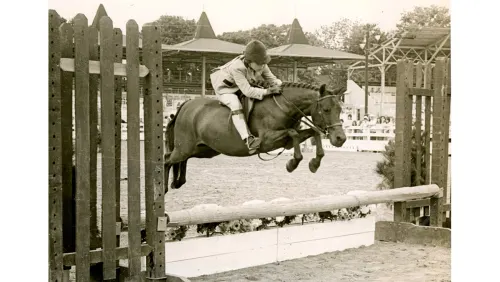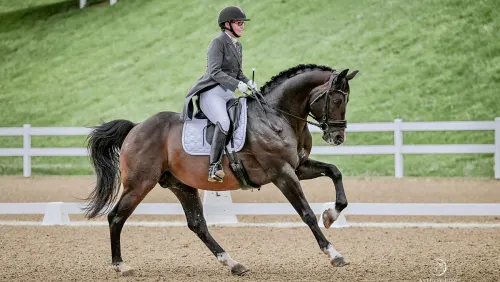Elisabeth “Pansy” Ireland Poe’s membership in the U.S. Polo Association may have been short-lived, but it was also groundbreaking. She registered with the USPA using only her initials to hide the fact that she was a woman and played on men’s teams 50 years before females were granted admittance to the organization.
When her identity was discovered by the USPA, the organization revoked both her membership and her handicap. Poe continued playing in women’s games and went on to make a name for herself in both the hunter/jumper and Thoroughbred racing worlds.
And throughout each of her equestrian ventures, Poe was an avid supporter of fellow horsewomen, from the show ring to the racetrack, and a philanthropist who used her wealth to build up the people and places that she held dear.
A Love Of Stick-And-Ball
Despite being only 5 feet tall, from the first time she swung a polo mallet, it was clear Poe had a great deal of natural talent.
A native of Cleveland, Ohio, with a lifelong presence at her family’s Pebble Hill Plantation in Thomasville, Georgia, Poe played on competitive women’s teams as a young adult, traveling from her local Chagrin Valley, Ohio, to places like Virginia and New York for tournaments.
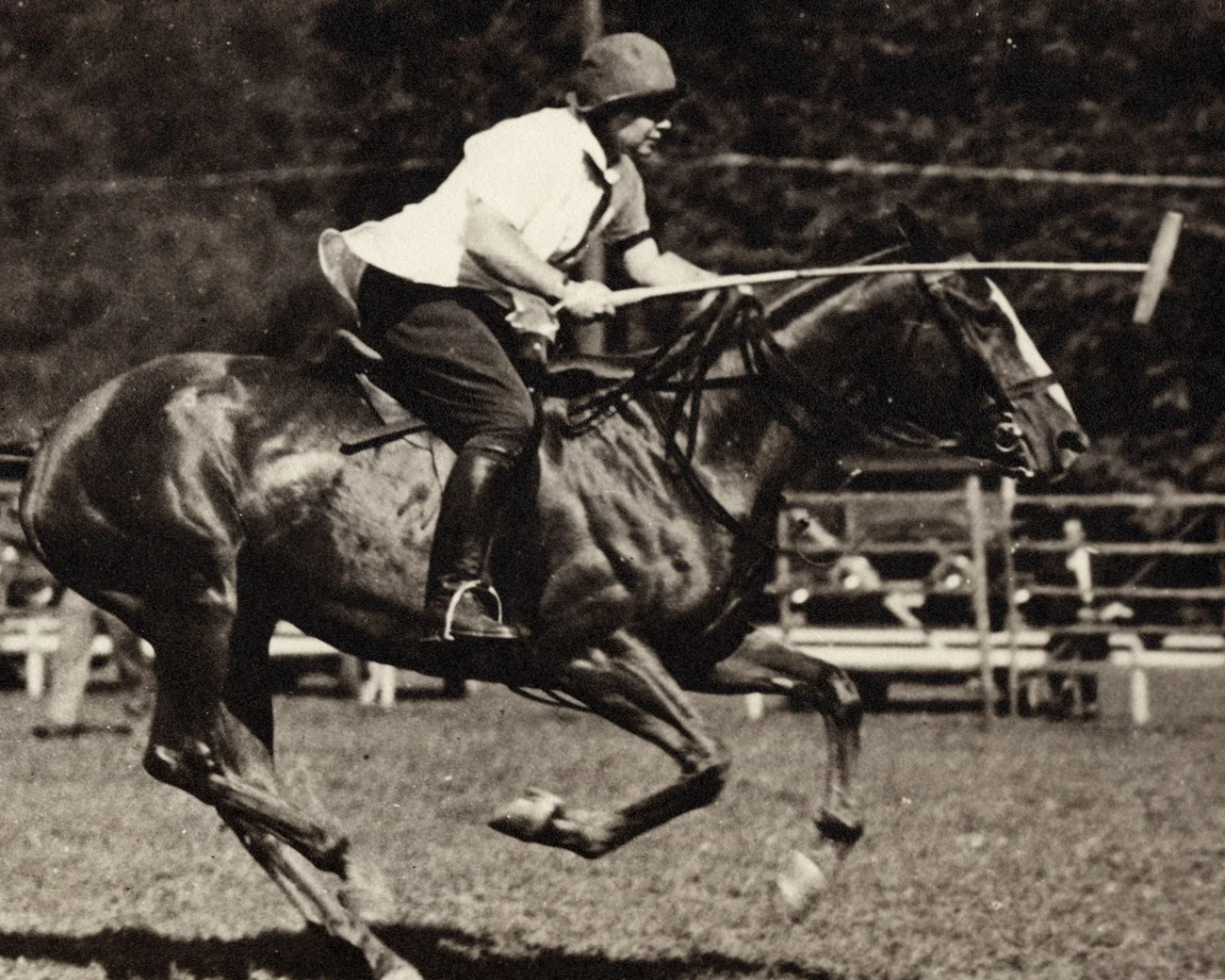
“But I think she grew bored playing with the ladies,” said Kim McCray, communications coordinator at Pebble Hill Plantation, Poe’s family estate. “She was so much better than them.”
Using her initials, the then-Elisabeth Ireland registered with the USPA—an organization that was, at the time, only open to men—in 1925.
“She wasn’t trying to be deceptive,” added Lori Curtis, Pebble Hill’s museum curator. “She didn’t try to disguise herself as a man. She just pulled her hair back, put on her uniform and played. All her teammates knew who she was, but they respected her as a player, and no one on the teams had an issue with it. She just wanted to play polo.”
“I don’t think she was an intentional feminist,” said McCray. “She just did what she wanted to do. She was an excellent player, and she wanted to play with the best.”
She was such a force on the polo field that she was featured—along with notable equestrians such as the king of Spain and the prince of Wales—in an undated, circa 1930 limited edition leather-bound book titled “International Sport” that profiles, according to its editor, “the most interesting and notable names in the present-day world of equestrian sport.”
“Those who deny that women have achieved equal rights with men and claim that the so-called weaker sex are not as capable as the men will have a rude awakening if they happen to witness any of the polo games in the vicinity of Cleveland and see a young woman playing in polo matches against the male competitors, with much the same spirit and dash, quickness and accuracy as her male competitors,” the entry about Poe begins, according to the volume kept at the National Sporting Library and Museum in Middleburg, Virginia.
In 1925, before the USPA realized that she was a woman, Poe earned a handicap rating of “1.” When her gender was discovered, the USPA stripped her of both her membership and her rating. Despite Poe as proof that ladies could hold their own with the men on the field, women were not granted membership to the USPA until 1972—about 50 years after Poe played in a USPA match for the first time.
Poe continued to play polo on women’s teams, competitively through her 20s and more casually through her 30s. Her passion for the sport continued throughout her life, and she regularly hosted matches at her various properties, including Pebble Hill. (This weekend, Pebble Hill will celebrate Poe’s contributions to the sport at its second-annual Pebble Hill Polo Classic. In honor of Poe, every player on the field that day will be female.)
“I’d love to see the USPA restore her membership posthumously,” said Curtis, who also has nominated Poe for admittance to the Museum of Polo Hall of Fame. “I think she’d look down and be really happy about that. She was a trailblazer for the sport, and she deserves to be recognized for her contributions, though she wouldn’t be interested in that recognition. She just wanted to be treated equally. She just wanted to play.”
ADVERTISEMENT
Ribbons In A Closet
Poe was born into an equestrian family: her stepfather bred and trained trotting horses, and her mother loved to foxhunt. By age 3, young Elisabeth, astride her pony Chintz, was being led on hunts by her mother.
As a little girl, she was also a regular competitor in horse shows that her family helped to establish near their Georgia estate. She remained an avid competitor, trainer, and owner for the next several decades. Poe competed heavily, and successfully, in the Chagrin Valley and along the East Coast. Her most successful horse, Mighty, won three Cleveland Horse Show Championships, according to her International Sport profile.
She also had a title from Madison Square Garden to her name. In 1929, she won the Hunter Stakes Championship at the National Horse Show on her 6-year-old mare Sunrise. But when she didn’t like the topper on her trophy, McCray said, she commissioned the late equestrian sculptor Hughlette “Tex” Wheeler to design a new one in Sunrise’s likeness, and she replaced the offending detail.
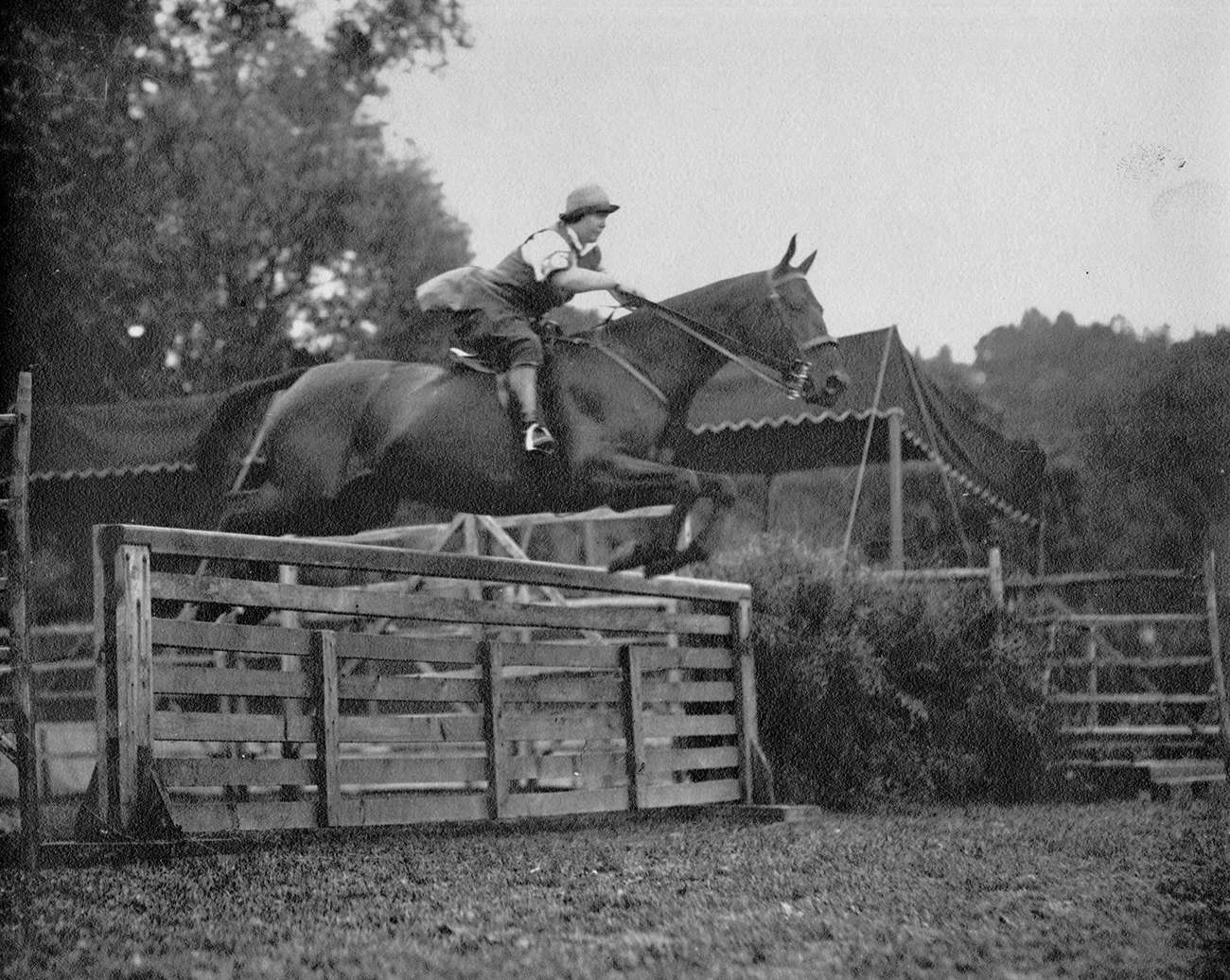
Her strong feelings about that particular trophy were a bit out of character, as very few of her equestrian awards were even displayed publicly in her home.
“She kept her ribbons in a closet downstairs. It was elaborate—it had drawers and doors that opened up to hold everything—but nothing was visible to everyday visitors,” McCray said. “She was really very modest and quiet about all of her successes. She wasn’t ever seeking recognition. She just did her thing with horses—whatever discipline it happened to be—because she just loved everything about them.”
In her late 30s, health issues slowed and eventually ended Poe’s own riding career, but she remained involved in the hunter/jumper world. A number of legendary riders, many of them female, competed Poe’s horses for her.
“When she could no longer ride, she hired prominent riders of the time—mainly women—to ride for her,” McCray said. “ She believed in propelling other women forward.”
One of those women was the legendary Ellie Wood Keith Baxter, who became a dear and lifelong friend. They met on the show circuit; Baxter was one of the nation’s top female riders at the time.
Baxter and her husband divorced at one point and remarried several years later. During their separation, Poe invited Baxter and her son, Charlie, to live at Pebble Hill, often welcoming them to the main house for meals. Poe, who was known for her sense of humor, once played a trick on the two, serving them rubber green beans and laughing with delight as they tried, unsuccessfully, to cut them.
“We were all dressed up,” Charlie remembered. “Coats and tails. And I remember looking at all the elaborate place settings so carefully. I ate everything last, making sure I was using the right utensils for each dish. My mom went right at those green beans, and Aunt Pansy, as I called her, just let out this huge belly laugh. I remember her as a person who often smiled, and who was always so uplifting.”
Poe financed the horse barn at Barracks Way, Ellie’s Virginia farm, and was a great supporter for the rest of her career. Ellie continued to be a regular short-term visitor to and resident at Pebble Hill.
“Those two were more than just employer and employee,” Charlie said. “They were dear friends.
“My mother was a strong woman with a big personality and had ideas and beliefs that were ahead of her time. Aunt Pansy saw that my mother had the potential to be a leader, and so she supported her, investing in her financially and providing riding and training opportunities, so that she could rise to that potential.”
“My mother was a strong woman with a big personality and had ideas and beliefs that were ahead of her time. Aunt Pansy saw that my mother had the potential to be a leader, and so she supported her, investing in her financially and providing riding and training opportunities, so that she could rise to that potential.”
Charlie Baxter, son of Ellie Wood Keith Baxter
McCray said Poe was that way with many of the dedicated horsewomen who crossed her path.
“Miss Pansy was always a cheerleader for other women,” she said. “She was always helping to raise others up.”
Thoroughbreds Across The Pond
When her health grounded Poe, she got involved in owning and breeding race horses, blazing more trails for women in yet another heavily male-dominated environment.
Poe purchased Shawnee Farm in Kentucky, which became her primary Thoroughbred breeding farm in the U.S.
ADVERTISEMENT
Poe was “obsessed” with Man O’ War, McCray said. The archives at Pebble Hill have fan-girl photos that Poe took of the big red horse, and she bought a number of his fillies for her breeding program. The Pebble Hill archives house all of Poe’s Thoroughbred stall nameplates; many are descendants of the famous racehorse.
Poe was also fascinated by English culture, especially its equestrian aspects. She adopted the English equestrian lifestyle: she was often followed around by a corgi or two, and she had an enormous collection of horse brasses, including one from Queen Elizabeth’s 1956 coronation.
It was only natural, then, that Poe’s involvement in Thoroughbreds would take her across the pond to the United Kingdom. She particularly enjoyed Ireland’s racing scene, and felt strongly that racing on turf was better for the health and longevity of her racehorses. She purchased a farm in Ireland and became more well-known in the Irish racing world than in the U.S.
Some of Ireland’s most well-known jockeys and trainers were under Poe’s employment, including legendary jockey and trainer Rosemary Rooney, who also forged her way in a male-dominated industry. Globemaster, bred by Poe, won the 1961 Wood Memorial Stakes. Another, Young Emperor, won the Gimcrack Stakes (England) and was the champion 2-year-old colt in Ireland and England in 1965, and was honored as Horse of the Year.
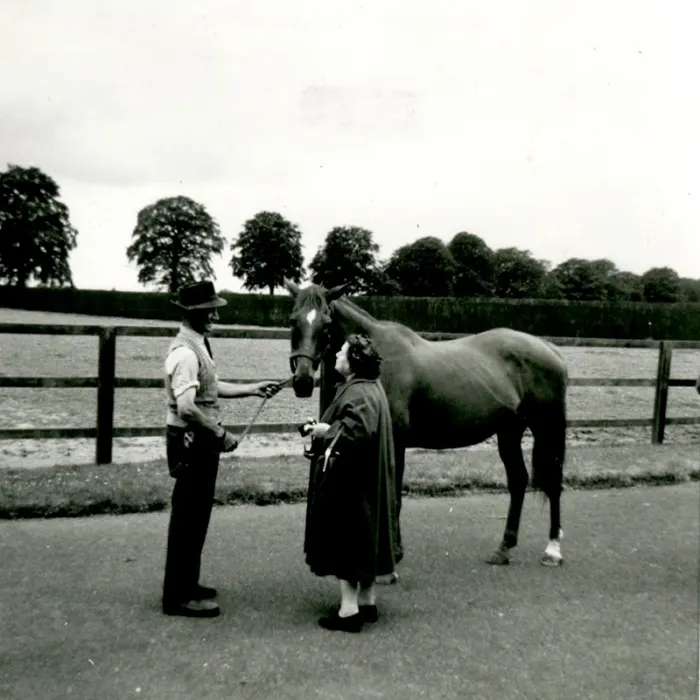
Thanks to that success, Poe was the guest of honor at the Gimcrack Dinner in December 1965 at the Royal Station Hotel in York, England, only the third woman invitee in the 195-year history of the all-male gathering. That night, she was the only woman in attendance. Telling her husband she was “bloody nervous” about addressing the group of 107 men, she asked him, last-minute, to talk on her behalf.
“I’ve never spoken in public in my life,” she said in a 1965 interview with the British Daily Sketch. “I just haven’t got it in me to speak to all those people.”
“For a woman during that time, her success was incredible,” said Curtis.
Poe was celebrated respected stateside as well. In 1958, she was the winner of the Kentucky Thoroughbred Breeders’ Association Ladies’ Sportsmanship award, and in 1972 she was honored by the Thoroughbred Club of America for her contributions to the sport.
She was the first woman named to the board of the Keeneland Association, another pioneering role for women in the male-dominated Thoroughbred racing world.
A Legacy Of Giving Back
Before he passed away, Poe’s grandfather, Howard Melville Hanna, a businessman and philanthropist who amassed great wealth through mining and oil, penned a letter to his children. With the privilege of wealth, he reminded them, comes the responsibility to positively impact other people, as well as the places you call home.
This family conviction passed down through generations and remained strong in Poe.
Having no children, Poe worried about Pebble Hill being split up by developers after her death. She created the Pebble Hill Foundation and willed the property to the public when she died in 1978. The first visitors toured the house and property in 1983.
Poe was also invested in the town of Thomasville, founding and funding the Thomasville-Thomas County Humane Society. In memory of her mother and grandparents, Poe purchased and gifted a historic property to the Thomasville History Center so that the organization could have a permanent home for its collections.
A passionate conservationist, Poe avidly supported local garden clubs and donated property as a space for the groups to gather. When the town’s “Big Oak,” a registered 350-plus-year-old oak tree, was in danger due to the sale of the property it grew on, Poe bought the property and turned it into a public space now known as the Elisabeth Ireland Poe Park.
“Her financial privilege definitely made it possible for her to do so much for others,” Curtis said. “But Miss Pansy was not someone who sought attention for the good that she did. She was very humble. She just wanted to do the things that she enjoyed doing, and help others along the way.”
“She was never fancy dressed,” McCray remembered. “She’d just walk down Broad Street in a muumuu. Everyone knew her. She had to sit on phone books in her car to see over the steering wheel, and she’d drive around Pebble Hill, watching young hunter riders in the jump field. If one did something she didn’t like, she’d honk her horn at them.
“And by the way,” said McCray, “Miss Pansy kept every issue of the Chronicle of the Horse. We have stacks and stacks of them in the archives, from the 1930s to the 1970s.”










